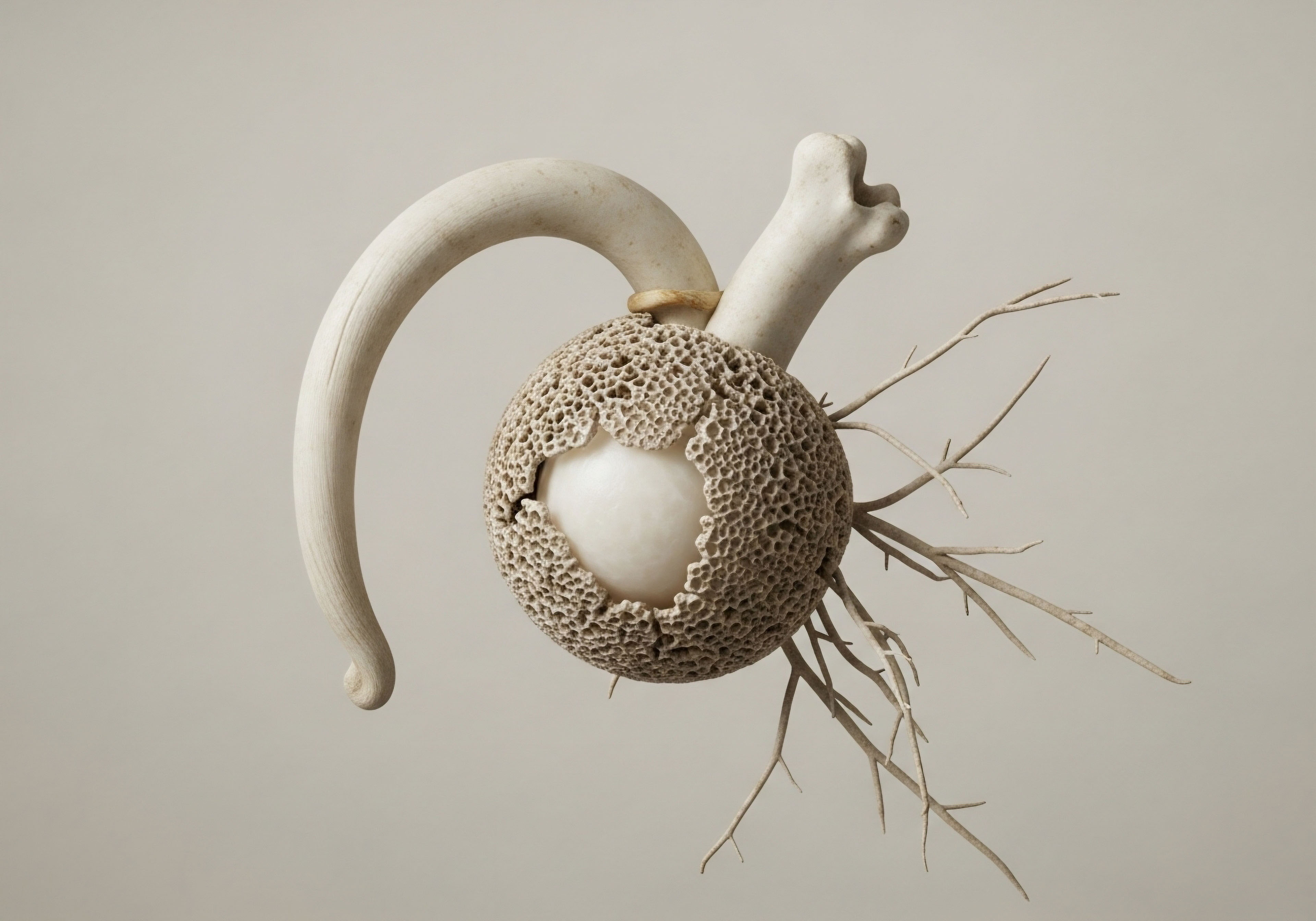

Fundamentals
Have you ever experienced those subtle shifts within your body, a lingering fatigue, perhaps a persistent brain fog, or even changes in your mood that seem to defy simple explanation? These sensations often prompt a deep, personal inquiry into what might be occurring beneath the surface.
For many, these experiences are not isolated incidents; they are signals from an intricate internal communication network, hinting at imbalances within the endocrine system. Understanding these signals marks the initial step on a path toward reclaiming vitality and function.
Our bodies operate as complex, interconnected systems, where one seemingly minor disruption can send ripples throughout the entire physiological landscape. Hormones, those powerful chemical messengers, orchestrate a vast array of bodily processes, from metabolism and energy regulation to mood stability and reproductive health.
When their delicate balance is disturbed, the effects can be far-reaching, influencing how we feel, think, and interact with the world. This journey of understanding begins with recognizing that your lived experience, those very symptoms you perceive, are valid indicators of underlying biological mechanisms at play.
A significant, yet often overlooked, contributor to hormonal equilibrium resides within the gastrointestinal tract ∞ the gut microbiome. This vast ecosystem of microorganisms, comprising trillions of bacteria, viruses, and fungi, exerts a profound influence on nearly every aspect of human health.
The gut is not merely a digestive organ; it acts as a central command center, communicating extensively with the endocrine system. This communication occurs through various pathways, including the production of metabolites, signaling molecules, and direct interactions with cells that regulate hormone secretion and activity.
The gut microbiome, a complex internal ecosystem, profoundly influences hormonal balance and overall well-being.
The relationship between the gut and hormones is a dynamic, two-way street. The composition and activity of your gut flora can directly impact how hormones are produced, metabolized, and eliminated from the body. Conversely, hormonal fluctuations can alter the gut environment, creating a continuous feedback loop. This intricate interplay means that supporting a healthy gut environment is not merely about digestive comfort; it represents a foundational strategy for optimizing hormonal health and, by extension, your overall well-being.

The Gut Endocrine Connection
The gut’s influence on the endocrine system extends beyond simple digestion. It participates in neuroendocrine effects, metabolic regulation, and even appetite control. Consider the production of short-chain fatty acids, or SCFAs, such as butyrate, propionate, and acetate, which are fermentation products of dietary fibers by beneficial gut bacteria.
These SCFAs are not just local energy sources for gut cells; they enter the bloodstream and can affect distant organs and systems, influencing metabolism and the release of hormones involved in appetite regulation and insulin secretion.
Moreover, the gut-brain axis represents a critical communication highway between the digestive tract and the central nervous system. This bidirectional pathway allows gut microbes to influence the production and release of neurotransmitters like serotonin and dopamine, which in turn affect mood and cognitive function. This connection also extends to stress hormones, where gut health can modulate the body’s response to stressors.

What Are Probiotics?
Probiotics are live microorganisms, typically bacteria and yeasts, which, when administered in adequate amounts, confer a health benefit on the host. They are often described as beneficial or friendly bacteria, working to restore and maintain the natural balance of microorganisms within the gut. These beneficial microbes can outcompete pathogenic organisms for resources and attachment sites, thereby enhancing gut health.
The selection of specific probiotic strains is paramount, as their effects are highly strain-specific. Different strains possess unique metabolic capabilities and interact with the host’s physiology in distinct ways. For instance, while one strain might excel at supporting digestive regularity, another could be more adept at modulating immune responses or influencing hormonal pathways. Understanding these distinctions is central to leveraging probiotics as a targeted tool in personalized wellness protocols.


Intermediate
The journey toward hormonal equilibrium often involves understanding the specific mechanisms through which various interventions operate. When considering probiotic strains for hormonal support, the focus shifts from general gut health to precise biochemical interactions. This section explores how different probiotic strains exert their influence on key hormonal systems, providing a clinically informed perspective on their application.

Probiotic Influence on Estrogen Metabolism
One of the most well-researched areas of probiotic influence on hormones involves estrogen metabolism, primarily through a specialized collection of gut bacteria known as the estrobolome. This aggregate of enteric bacterial genes produces enzymes capable of metabolizing and modulating the body’s circulating estrogen. A key enzyme within the estrobolome is beta-glucuronidase.
Estrogens, after fulfilling their biological roles, are typically processed by the liver through a process called conjugation, which deactivates them and prepares them for excretion via bile into the gut. A healthy estrobolome ensures that these deactivated estrogens are efficiently removed from the body.
However, if there is an imbalance in the gut microbiota, particularly an excess of bacteria producing beta-glucuronidase, this enzyme can “unpackage” the deactivated estrogens, reverting them back into their active, unconjugated form. These reactivated estrogens can then be reabsorbed into the bloodstream, potentially leading to elevated estrogen levels, a state often referred to as estrogen dominance.
Certain probiotic strains can help maintain a balanced estrobolome, thereby supporting the proper elimination of excess estrogen. For instance, strains of Lactobacillus acidophilus, Lactobacillus rhamnosus, and Lactobacillus reuteri have been studied for their ability to support gut barrier function and potentially influence estrogen metabolism. By promoting a diverse and healthy gut environment, these strains can indirectly contribute to more effective estrogen detoxification and excretion, which is particularly relevant for conditions like perimenopause and post-menopause, where hormonal fluctuations are common.
Specific probiotic strains can modulate estrogen levels by influencing the estrobolome, aiding in the proper elimination of excess hormones.

Modulating Androgen Levels with Probiotics
The gut microbiome also plays a significant role in the metabolism of androgens, including testosterone. This influence occurs through several mechanisms, such as conversion, deconjugation, and even aromatization. Certain gut bacteria, like those from the Clostridium genus, can convert testosterone into less active metabolites. Conversely, Bacteroides species, through their production of beta-glucuronidase enzymes, can deconjugate testosterone-glucuronide, potentially increasing the levels of free, active testosterone in circulation.
An unbalanced gut environment, or dysbiosis, can contribute to chronic, low-grade inflammation throughout the body. This inflammation can interfere with the body’s ability to produce testosterone efficiently, potentially impairing the function of Leydig cells in the testes, which are responsible for testosterone synthesis. Probiotic interventions, by reducing systemic inflammation and supporting intestinal barrier integrity, can indirectly support optimal testosterone production and metabolism.
While direct clinical trials on specific probiotic strains for testosterone optimization in men undergoing Testosterone Replacement Therapy (TRT) are still emerging, the foundational understanding of gut-androgen interactions suggests a supportive role. For men experiencing symptoms of low testosterone, addressing gut health with targeted probiotic strains could be a complementary strategy to their overall biochemical recalibration protocols.

Probiotics and Thyroid Function
The intricate connection between the gut and the thyroid gland, often termed the gut-thyroid axis, is another area where probiotics show promise. The gut microbiota influences the metabolism of iodothyronines, iodine, and selenium, and impacts the enterohepatic circulation of thyroid hormones. Dysbiosis has been correlated with primary hypothyroidism.
Some research indicates that probiotic adjunct therapy can modulate the gut microbiota, potentially leading to improvements in thyroid function and patient outcomes. For example, specific probiotic strains such as Lactiplantibacillus plantarum 299v and Bifidobacterium longum have demonstrated potential in enhancing the effects of traditional treatments for thyroid conditions.
While some studies have not shown a direct impact on TSH, fT3, or fT4 levels, others suggest a potential for stabilizing serum hormonal levels and reducing autoantibodies, such as TRAb (thyrotropin receptor antibody) in Graves’ disease.
The mechanisms involve the gut microbiota’s influence on nutrient absorption critical for thyroid hormone synthesis, its role in reducing systemic inflammation that can impair thyroid function, and its potential to modulate the immune system, which is particularly relevant in autoimmune thyroid conditions.

Stress Hormones and the Gut-Brain Axis
The hypothalamic-pituitary-adrenal (HPA) axis is the body’s central stress response system, culminating in the release of cortisol. Chronic activation of this axis can lead to elevated cortisol levels, which are known to suppress other hormonal systems, including testosterone production. The gut-brain axis provides a direct link through which the gut microbiome can influence the HPA axis and cortisol production.
Probiotic strains have been investigated for their capacity to modulate the HPA axis and impact cortisol levels. While some studies have yielded conflicting results, a meta-analysis suggests that probiotic supplementation may reduce cortisol levels, particularly in healthy populations experiencing stress. Strains like Lactobacillus plantarum 299v, Bifidobacterium longum, and Lactobacillus rhamnosus have been associated with improved gut-brain axis regulation and a reduction in stress- and anxiety-related symptoms, potentially through their influence on neurotransmitter production and anti-inflammatory effects.
By strengthening the intestinal barrier and reducing systemic inflammation, probiotics can help mitigate the physiological stressors that contribute to chronic cortisol elevation. A healthy intestinal barrier prevents harmful substances from entering the bloodstream, which can otherwise trigger inflammatory responses and further elevate cortisol. This holistic approach to stress management, starting from the gut, offers a compelling avenue for supporting overall hormonal balance.

Comparing Probiotic Strains and Their Hormonal Applications
The table below summarizes some key probiotic strains and their documented or hypothesized roles in hormonal support, highlighting the specificity required for targeted interventions.
| Probiotic Strain | Primary Hormonal Support Area | Proposed Mechanism |
|---|---|---|
| Lactobacillus acidophilus | Estrogen metabolism, gut barrier integrity | Modulates estrobolome activity, reduces beta-glucuronidase, supports healthy estrogen excretion. |
| Lactobacillus rhamnosus | Estrogen metabolism, stress hormone regulation | Influences estrobolome, supports gut-brain axis, potentially reduces cortisol. |
| Lactobacillus reuteri | Estrogen metabolism, gut barrier function | Aids in healthy estrogen processing and gut integrity. |
| Bifidobacterium bifidum | Immune health, digestion, general gut balance | Supports overall gut diversity, indirectly aids hormonal balance by reducing inflammation. |
| Bifidobacterium lactis | Immune health, digestion, general gut balance | Contributes to a balanced microbiome, supporting systemic health that impacts hormones. |
| Bifidobacterium longum | Thyroid function, stress hormone regulation | Modulates gut-thyroid axis, influences HPA axis, potentially reduces cortisol. |
| Lactiplantibacillus plantarum 299v | Thyroid function, stress hormone regulation | May enhance thyroid treatment effects, reduces cortisol levels during stress. |
| Clostridium species (certain) | Testosterone metabolism (conversion) | Can convert testosterone into less active metabolites. |
| Bacteroides species | Testosterone metabolism (deconjugation) | Produce beta-glucuronidase, potentially increasing free testosterone. |
This table underscores the importance of strain-specific selection rather than a generic approach to probiotic supplementation. A precise understanding of how each strain interacts with the body’s biochemical pathways allows for a more targeted and effective strategy in supporting hormonal health.

How Can Probiotics Support Hormone Optimization Protocols?
For individuals undergoing hormonal optimization protocols, such as Testosterone Replacement Therapy (TRT) for men or women, or peptide therapies, gut health plays a supportive role. A healthy gut microbiome can influence the absorption and metabolism of exogenous hormones and peptides, potentially affecting their efficacy and minimizing side effects.
For instance, in men receiving TRT, maintaining a balanced gut environment can help manage the conversion of testosterone to estrogen, a process influenced by gut bacteria. While Anastrozole is used to block estrogen conversion, a healthy gut can complement this by ensuring proper estrogen excretion, reducing the overall burden on the body’s detoxification pathways.
Similarly, for women on testosterone or progesterone protocols, optimizing gut health can support the body’s natural processes for hormone metabolism and elimination, contributing to better symptom management and overall well-being.
Peptide therapies, such as Sermorelin or Ipamorelin/CJC-1295 for growth hormone support, or PT-141 for sexual health, rely on optimal systemic function for their effectiveness. A healthy gut reduces systemic inflammation and supports nutrient absorption, creating a more favorable internal environment for these peptides to exert their intended effects. The gut’s influence on the immune system and inflammatory responses is particularly relevant, as chronic inflammation can impede the efficacy of various therapeutic interventions.


Academic
The exploration of probiotic strains and their differing roles in hormonal support requires a deep dive into the molecular and cellular mechanisms that govern these interactions. This section moves beyond general concepts to analyze the complexities from a systems-biology perspective, discussing the interplay of biological axes, metabolic pathways, and specific enzymatic activities. The goal is to provide a comprehensive understanding of the biological ‘why’ behind these observed effects.

The Gut Microbiome and Steroid Hormone Metabolism
Steroid hormones, including estrogens and androgens, undergo extensive metabolism in the liver and gut. This process, known as enterohepatic circulation, is significantly influenced by the gut microbiome. After hepatic conjugation, where hormones are bound to molecules like glucuronic acid or sulfate to make them water-soluble for excretion, they are transported to the intestines via bile.
Here, specific bacterial enzymes, most notably beta-glucuronidase, can deconjugate these hormones, releasing them back into their active, unconjugated forms. This deconjugation allows for reabsorption into the systemic circulation, effectively increasing the circulating pool of active hormones. The balance of bacterial species producing beta-glucuronidase is therefore a critical determinant of circulating hormone levels. An overabundance of these bacteria can lead to increased reabsorption and, consequently, higher systemic levels of certain hormones, such as estrogen.
Research has identified various bacterial genera capable of producing beta-glucuronidase, including species within Bacteroides, Clostridium, Ruminococcus, and Escherichia. The specific activity levels of these enzymes vary among strains and are influenced by dietary factors and the overall gut environment. For instance, a diet rich in fermentable fibers can alter the composition of the gut microbiota, potentially influencing beta-glucuronidase activity and, by extension, hormone reabsorption.

Microbial Modulation of the Hypothalamic-Pituitary-Gonadal Axis
The Hypothalamic-Pituitary-Gonadal (HPG) axis represents a central regulatory pathway for reproductive hormones. Emerging evidence suggests that the gut microbiome can influence this axis through various indirect and direct mechanisms. The gut-brain axis, a bidirectional communication system, serves as a conduit for these influences. Gut microbes can produce neurotransmitters, short-chain fatty acids, and other signaling molecules that can cross the blood-brain barrier or interact with the enteric nervous system, thereby influencing hypothalamic and pituitary function.
For example, certain gut bacteria can influence the release of gonadotropin-releasing hormone (GnRH) from the hypothalamus, which in turn affects the secretion of luteinizing hormone (LH) and follicle-stimulating hormone (FSH) from the pituitary gland. LH, in particular, stimulates testosterone synthesis in the testes. Alterations in gut microbiota composition, or dysbiosis, have been correlated with changes in LH and FSH levels, potentially contributing to conditions like polycystic ovary syndrome (PCOS) in women and hypogonadism in men.
A study analyzing venous blood samples found that men with healthier gut microbiota exhibited higher levels of free testosterone, which was associated with lower levels of Sex Hormone Binding Globulin (SHBG). SHBG is a protein that binds to sex hormones, making them inactive. Some gut bacteria may influence SHBG production, thereby affecting the bioavailability of testosterone. This complex interplay highlights how microbial balance can indirectly support the HPG axis’s optimal functioning.

The Gut Microbiome and Thyroid Hormone Homeostasis
The thyroid gland’s function is intimately linked with gut health through what is termed the gut-thyroid axis. This connection involves several mechanisms, including the absorption of essential micronutrients, the conversion of thyroid hormones, and immune modulation.
The conversion of inactive thyroxine (T4) to active triiodothyronine (T3), the primary biologically active thyroid hormone, occurs not only in the thyroid gland but also in peripheral tissues, including the gut. Certain gut bacteria possess deiodinase enzymes that can facilitate this conversion. Moreover, the gut microbiome influences the absorption of critical nutrients for thyroid health, such as iodine and selenium.
In autoimmune thyroid conditions, such as Hashimoto’s thyroiditis and Graves’ disease, the gut microbiome’s role in immune regulation becomes particularly relevant. The majority of immune cells reside in the gut-associated lymphoid tissue (GALT). An imbalanced gut microbiota can contribute to increased intestinal permeability, often referred to as “leaky gut,” allowing bacterial components and undigested food particles to enter the bloodstream. This can trigger systemic inflammation and autoimmune responses, potentially exacerbating thyroid autoimmunity.
Clinical trials have explored the impact of probiotics on thyroid function. While some meta-analyses indicate no significant direct changes in TSH, fT3, or fT4 levels with probiotic supplementation, there is evidence suggesting a modest reduction in TRAb levels in patients with Graves’ disease.
This indicates a potential role for probiotics in modulating the autoimmune component of thyroid disorders. Specific strains, such as Lactiplantibacillus plantarum 299v and Bifidobacterium longum, have been investigated for their immunomodulatory effects and their potential to support a balanced gut microbiota, which could indirectly benefit thyroid health.

Probiotics and the Hypothalamic-Pituitary-Adrenal Axis
The Hypothalamic-Pituitary-Adrenal (HPA) axis is the body’s primary neuroendocrine response to stress, leading to the release of cortisol. Chronic stress and sustained cortisol elevation can have detrimental effects on overall hormonal balance, including the suppression of sex hormone production. The gut microbiome influences the HPA axis through the gut-brain axis, impacting neurotransmitter production, inflammatory pathways, and direct signaling.
Studies have shown that certain probiotic strains can modulate the HPA axis. For example, some research indicates that specific strains, such as Lactobacillus plantarum 299v, can reduce salivary cortisol levels during periods of stress. The mechanisms involve the gut microbiota’s ability to influence the vagus nerve, a primary communication channel between the gut and the brain. Activation of the vagus nerve can lead to a calmer stress response and potentially lower cortisol levels.
Moreover, probiotics contribute to strengthening the intestinal barrier, which prevents the translocation of bacterial toxins (e.g. lipopolysaccharides or LPS) into the bloodstream. LPS can trigger systemic inflammation, which in turn activates the HPA axis and increases cortisol production. By maintaining gut barrier integrity, probiotics can reduce this inflammatory stimulus, thereby supporting healthier cortisol regulation.
The production of short-chain fatty acids (SCFAs) by gut bacteria also plays a role. SCFAs can interact with G-protein coupled receptors on enteroendocrine cells, influencing the release of gut hormones and signaling molecules that can indirectly affect the HPA axis. The collective impact of these microbial activities contributes to a more resilient stress response and improved hormonal regulation.

Advanced Considerations for Probiotic Selection
Selecting probiotic strains for specific hormonal support requires a nuanced understanding of their individual properties and the host’s unique physiological context.
- Strain Specificity ∞ The benefits of probiotics are highly strain-dependent. A species name, such as Lactobacillus acidophilus, is insufficient; the specific strain designation (e.g. NCFM, LA-5) is crucial, as different strains within the same species can have distinct effects.
- Mechanism of Action ∞ Understanding the proposed mechanism ∞ whether it’s direct enzymatic activity, modulation of the gut-brain axis, reduction of inflammation, or SCFA production ∞ guides the selection process.
- Clinical Evidence ∞ Prioritizing strains with robust clinical trial data supporting their efficacy for the targeted hormonal outcome is paramount.
- Viability and Delivery ∞ Ensuring the probiotic product contains viable organisms at the time of consumption and that they can survive transit through the digestive tract is essential for therapeutic effect.
The integration of probiotic strategies into comprehensive hormonal optimization protocols, such as those involving Testosterone Replacement Therapy or Growth Hormone Peptide Therapy, represents a sophisticated approach to personalized wellness. By addressing the foundational health of the gut microbiome, clinicians can potentially enhance the body’s response to these interventions, optimize metabolic function, and support overall endocrine resilience. This holistic perspective acknowledges the profound interconnectedness of biological systems, moving beyond isolated treatments to a more integrated model of care.
| Hormonal Axis | Key Hormones Involved | Probiotic-Mediated Mechanisms |
|---|---|---|
| Estrogen Metabolism | Estrogens (Estradiol, Estrone, Estriol) | Modulation of beta-glucuronidase activity by estrobolome, influencing enterohepatic recirculation and excretion. |
| Androgen Metabolism | Testosterone, DHT | Bacterial conversion to active/inactive metabolites, influence on SHBG, reduction of systemic inflammation affecting Leydig cells. |
| Thyroid Axis | TSH, T4, T3, TRAb | Influence on T4 to T3 conversion, nutrient absorption (iodine, selenium), immune modulation (reducing autoimmunity), gut barrier integrity. |
| Adrenal Axis (Stress) | Cortisol, Adrenaline | Modulation of HPA axis via gut-brain axis, vagal nerve stimulation, reduction of inflammatory stimuli (LPS), neurotransmitter influence. |
This detailed examination underscores that the impact of probiotic strains on hormonal health is not a simplistic cause-and-effect relationship. It involves a complex web of interactions at the molecular, cellular, and systemic levels, requiring a precise and evidence-based approach to their application in personalized wellness protocols.
Probiotic benefits are strain-specific, requiring careful selection based on clinical evidence and targeted mechanisms of action.

Do Probiotic Strains Influence Peptide Therapy Outcomes?
While direct studies linking specific probiotic strains to the efficacy of peptide therapies are still in their nascent stages, the underlying principles of gut health offer compelling theoretical connections. Peptides, such as Sermorelin or Ipamorelin/CJC-1295, are designed to stimulate the body’s natural production of growth hormone or other specific physiological responses. Their effectiveness relies on optimal systemic conditions, including efficient absorption, reduced inflammation, and robust cellular signaling.
A healthy gut microbiome contributes to a less inflammatory systemic environment. Chronic, low-grade inflammation can impair cellular receptor sensitivity and overall metabolic efficiency, potentially diminishing the responsiveness to therapeutic peptides. By reducing inflammatory markers and strengthening the intestinal barrier, certain probiotic strains can create a more conducive internal milieu for peptide action.
Furthermore, the gut’s role in nutrient absorption ensures that the body has the necessary building blocks for endogenous hormone and peptide synthesis, which these therapies aim to stimulate.
Consider peptides like PT-141, used for sexual health. Its action involves melanocortin receptors in the central nervous system. The gut-brain axis, influenced by probiotics, could theoretically modulate neurotransmitter balance and overall neurological function, which might indirectly support the pathways involved in PT-141’s efficacy. While this area requires more dedicated research, the holistic perspective suggests that a well-supported gut microbiome can enhance the body’s overall physiological resilience, thereby creating a more receptive environment for advanced biochemical recalibration strategies.

References
- Plottel, C. S. & Blaser, M. J. (2011). The Estrobolome ∞ A New Target for Health and Disease. Journal of Clinical Endocrinology & Metabolism, 96(10), 2977 ∞ 2980.
- Baker, J. M. et al. (2017). Estrogen Metabolism and the Gut Microbiome. Journal of Steroid Biochemistry and Molecular Biology, 172, 135 ∞ 142.
- Neuman, M. et al. (2015). The Gut-Brain Axis in Stress Response ∞ Focus on the Microbiome. Journal of Neuroendocrinology, 27(4), 472 ∞ 488.
- Messaoudi, M. et al. (2011). Assessment of psychotropic properties of a probiotic formulation (Lactobacillus helveticus R0052 and Bifidobacterium longum R0175) in healthy subjects by an emotional questionnaire, and neurophysiological and biochemical approaches. Gut Microbes, 2(4), 256 ∞ 261.
- Sikorska, A. et al. (2022). The Effect of Probiotic Supplementation on Cortisol Levels ∞ A Systematic Review and Meta-Analysis. Nutrients, 14(17), 3516.
- Shu, R. et al. (2024). Recent advances in gut microbiota and thyroid disease ∞ pathogenesis and therapeutics in autoimmune, neoplastic, and nodular conditions. Frontiers in Endocrinology, 15, 1346570.
- Talebi, M. et al. (2021). Effects of Probiotics on Thyroid Function and Fatigue in Hypothyroid Patients ∞ A Randomized Placebo Controlled Trial. Endocrinology Research and Practice, 5(2), 101 ∞ 108.
- Colldén, H. et al. (2019). The gut microbiota modulates host testosterone levels and sexual behavior. FASEB Journal, 33(1), 171 ∞ 182.
- Yan, Y. et al. (2024). Potential relationship of the gut microbiome with testosterone level in men ∞ a systematic review. Universitas Airlangga, 1-10.
- Spaggiari, G. et al. (2017). Probiotics Ingestion Does Not Directly Affect Thyroid Hormonal Parameters in Hypothyroid Patients on Levothyroxine Treatment. Frontiers in Endocrinology, 8, 316.

Reflection
Having explored the intricate connections between probiotic strains and hormonal support, you now possess a deeper understanding of your body’s remarkable internal systems. This knowledge is not merely academic; it is a powerful tool for self-discovery and proactive health management. The insights gained here are an invitation to consider your own biological landscape with renewed perspective.
Your personal health journey is unique, shaped by a complex interplay of genetics, lifestyle, and environmental factors. The information presented serves as a guide, illuminating the pathways through which gut health can influence your endocrine system. This understanding empowers you to engage more meaningfully with your health decisions, recognizing that seemingly disparate symptoms might indeed be connected by underlying biological threads.
Consider this exploration a foundational step. The path to optimal vitality often requires personalized guidance, integrating detailed lab assessments with a comprehensive understanding of your individual needs. Armed with this knowledge, you are better equipped to collaborate with clinical professionals, tailoring protocols that truly resonate with your body’s inherent intelligence and support your long-term well-being.



